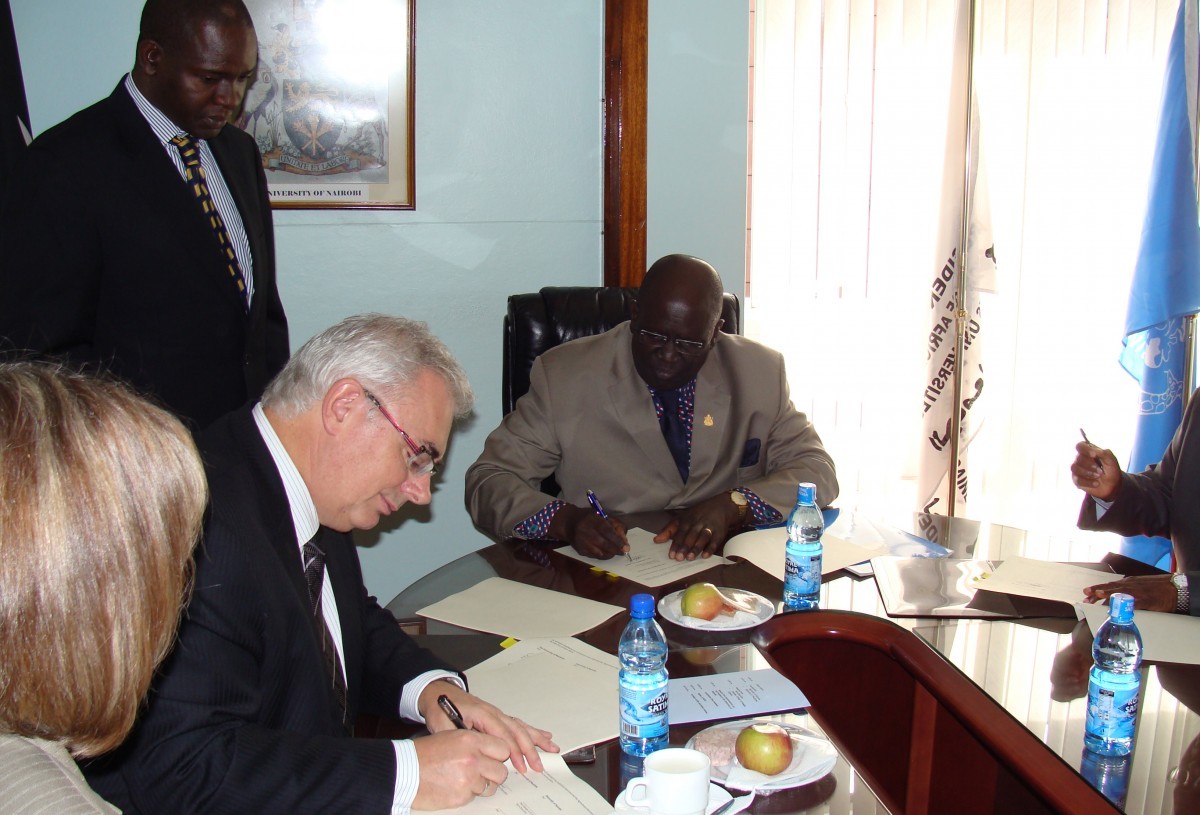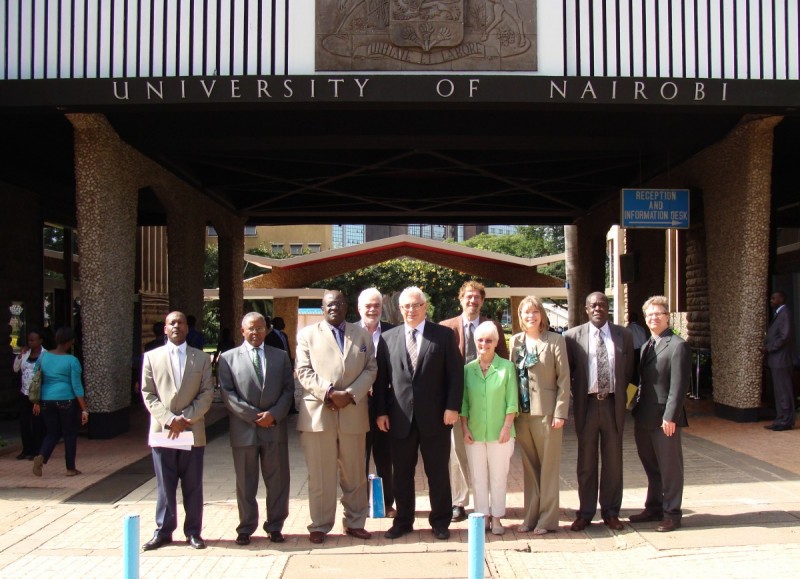
President Barnard signing MOU at the University of Nairobi in 2013.
Unique new NGO in Kenya lets university work locally
Dr. Stephen Moses says that the university’s new NGO in Kenya is unique.
“This [NGO, or non-governmental organization] concept gives the university a different foundation for international partnerships — one that is better positioned to work at the local level, contributing to the fabric and well-being of the community,” says Moses, who is a professor of medical microbiology and community health sciences (where he also serves as department head), College of Medicine, Faculty of Health Sciences. Moses has been a front line fighter in the global battle against HIV/AIDS as part of a collaborative team developing groundbreaking research and prevention programs to fight the spread of the disease in Africa and India.
The new NGO, Partners for Health and Development in Africa (PHDA), builds on over 30 years of the U of M’s work in Africa, adds Moses, naming previous executive director of the office of international relations Jim Dean as an early instigator in the process.
The research collaboration with the University of Nairobi is one of the University of Manitoba’s most enduring and successful partnerships, saving lives for more than three decades. Based on trust and mutual respect and grounded in a desire to help others, it reached a significant milestone in 2013 when both universities signed a five-year renewal of agreements.
On Wednesday, June 25, the university community has an opportunity to meet Mr. Peter Mwaura, PHDA’s new CEO, at a Meet & Greet Reception. The reception takes place from 3:30 to 5:00 at Bistro 205, second floor of University Centre.
Current manager of the office of international relations Rhonda Friesen says that the university’s new NGO in Kenya is about “pursuing reciprocity.”
The creation of the NGO aligns with the university’s international strategy, one of the key pillars of which is an internationally engaged university.
She points out that the U of M has an excellent reputation in Africa, thanks to the years of the university’s involvement there, and that the new NGO will provide support to UM interests and engagement in Kenya and the region. As an NGO, PHDA will enable UM to have more latitude to work with different organizations and institutions, apply for new grants, bid for consultancies, and expand its services to engage a widening scope of UM faculty members, staff and students.
UM Today spoke with the new CEO, who has been in Manitoba over the past week or so. His role will be to manage the NGO, which will help to operationalize development programs, research projects, student mobility and other activities between the University of Manitoba and Kenyan or African communities and institutions such as universities.
“My office in Nairobi will be a focal point from which to engage with the communities in Kenya and Africa in general,” Mwaura says. “It’s been exciting to be at the University of Manitoba for the past while…. It was an eye-opener on many different levels: the global focus through international relations is obvious. I’m pleased to be part of the global focus of the U of M and its impact on the communities out there. I know the U of M is a teaching and research university — for the faculty and students, this is also a very good opportunity.”
As Friesen says, “Our global awareness and involvement as a UM community — from initiatives such as this NGO to our international students to our outbound student mobility such as student service learning and study exchanges — help to shape us and define our role as global citizens.”
–Mariianne Mays Wiebe
***
Partners for Health and Development in Africa (PHDA)
The primary objective of PHDA is:
“To work with key stakeholders in Africa to further mobilize the international interests of the University of Manitoba through the relational expertise of PHDA.
Specific objectives of PHDA are to enable and support UM initiatives to:
- Provide health services (including public health) in Africa.
- Promote research into public health issues that impact Africa.
- Support research into development issues in Africa.
- Provide educational opportunities to individuals in Africa.
- Promote cooperation between educational institutions, non-governmental organizations, and government agencies in Kenya and elsewhere.
UM faculty members who are interested in participating in such initiatives of the PHDA are asked to contact the Office of International Relations, which will serve as primary contact point for liaison between Manitoba and PHDA in Nairobi, Kenya.
***
Meet & Greet Reception with PHDA’s new CEO: June 25, from 3:30 to 5:00 at Bistro 205, second floor of University Centre.
The PHDA Board at the U of M would like to personally introduce you to Mr. Peter Mwaura, who joined us on May 12 the Chief Executive Officer (CEO) of PHDA in Kenya. He is in Manitoba to meet with academic and administrative units to get to know our university and provide opportunity for individuals here to learn of the new opportunities afforded to members of our UM community through Mwaura and his team.
Background
Mr. Peter Mwaura is the Chief Executive Officer of Partners for Health and Development in Africa (PHDA), a non-profit organization sponsored by University of Manitoba and registered in Kenya. Mwaura has a BSc (Hons) Agricultural Economics from Egerton University, Kenya, MBA (Strategic Management) from United States International University-Africa, Diploma in Human Resources Management (Kenya Institute of Management) and is a full member of the Kenya Institute of Management (KIM) and a mentor/coach with ementoring Africa.
With over 17 years senior leadership and management experience in both the private sector and NGO sectors, Mwaura worked for 10 years as a senior manager in the private Agribusiness sector (multinational companies) in various agricultural sub-sectors before joining the NGO sector where he worked as Regional manager and Country Operations Manager (Technoserve, Tanzania). He has also had brief international assignments in Rwanda, Ethiopia and USA.
Mwaura joined PHDA in May 2014 from Evidence Action (Affiliated to Innovations for Poverty Action, a USA registered research non- profit organization) where he was the Kenya Program Director for the dispenser for safe water program. At Evidence Action, Peter led the safe water program from humble beginnings, building systems, structures and a high performing team to support thousands of rural communities access safe water through an international award winning chlorine dispenser technology. About 1.4 million people in Kenya access safe water through the chlorine dispenser averting deaths occasioned by preventable water borne diseases (i.e. diarrhea, typhoid etc).
***
More on the history of the U of M’s work in Africa and the relationship between U of M and the University of Nairobi:
President and Vice-Chancellor Dr. David Barnard travelled to Kenya in 2013 to sign the agreement with Prof. George Magoha, Vice-Chancellor of the University of Nairobi, during a conference that attracted infectious disease experts from around the world.
The collaboration between the two institutions has over the years flourished in the establishment and growth of the University of Nairobi Institute for Tropical and Infectious Diseases (UNITID). UNITID was established in 2003 with the mandate of harnessing research activities and initiating training programs geared towards management and control of infectious diseases. The Institute houses two Biosafety Level 3 Laboratories which are run through joint partnership between the two universities and the National Microbiology Laboratory of Canada.
Renewal of the MOU will ensure that operations and management of the UNITID facilities will proceed as planned and will continue the tremendous strides in research in infectious diseases already realized. The University’s work in Kenya has generated much of what we now know about the HIV epidemic in Africa, and has had enormous impact on global STI/HIV/AIDS-related health policy around the globe.
The Manitoba/Nairobi team has collectively trained and mentored approximately 500 highly skilled professionals for over 30 years, including doctors, nurses, scientists, laboratory technologists, and peer educators. Many Africans and Canadians who were trained through the program are now in leadership positions in the global health field, making contributions in Africa and globally.
To learn more about the research of Dr. James Blanchard (Director of the UM Centre for Global Public Health) and his colleagues see OnManitoba at:
issuu.com/umanitoba/docs/onmb_spring2013/17
To learn more about HIV/AIDS research visit:
Centre for Global Public Health
College of Health Sciences, University of Nairobi
Error thrown
Object of class WP_Error could not be converted to string







